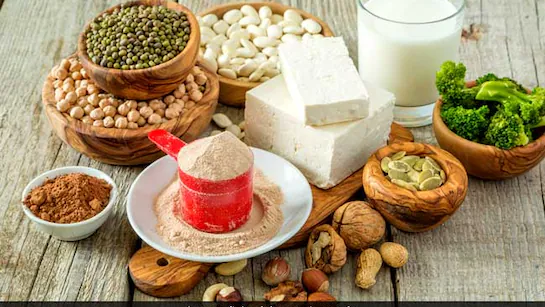Introduction
Protein is an essential macronutrient which is required to weightlifting and build muscles, repair tissues and produce enzymes. It is important to establish what an adequate protein intake looks like in female weightlifters because consumers and practitioners alike show interest in protein for maintaining health. This article will discuss what is considered adequate protein intake and how to meet this goal through your diet.
The Importance of Protein
The body uses protein in many ways, so it’s an important nutrient needed for:
- Muscle Growth & Repair: Proteins deliver the amino acids your body requires to repair and grow torn or damaged muscle.
- Metabolic Health: Protein aids in metabolism, and blood sugar control.
- Bone Health: It is also supports strong bones when partnered with calcium and vitamin D.
- Immune System: Proteins are necessary to create antibodies, as well as for cell repair.
- Production of Hormones: They help in the production and regulation of hormones.
Determining Sufficient Protein Intake
Those numbers can shift up or down based on your age, sex, how much activity you get, and your overall state of health. Protein consumption is usually recommended in g/kg body weight.
General Recommendations
- Sedentary Adults: ~0.8 g/kg body weight. For a 70 kg (154 lb) person, that’s roughly 56 grams of protein each day.
- Active Adults: Participants in regular physical activities may need 1.0-1.5 g/kg. This is in order to support muscle repair and energy requirements.
- Athletes and Bodybuilders : Increased activity levels will cause increased need 1.5 2.0 g/kg to aid in muscle building and recovery.
- Elderly: May benefit from 1.0-1.2 g/kg to protect against muscle loss and maintain bone health.
Special Considerations
- Pregnant or Breastfeeding Women: Higher protein requirements to help the baby to grow and to produce milk.
- Ailments: From kidney disease to metabolic anomalies, ask a healthcare professional if you have special needs.
Achieving Sufficient Protein Intake
Consumption of multiple types of protein will guarantee you will maintain the essential amino acids in the diet.
Animal-Based Proteins
- Chicken and Turkey: Lean and high in protein, which can be used in any type of meal.
- Fish: Salmon, mackerel and sardines contain protein and omega 3 fatty acids, which are heart-healthy.
- Eggs: Provide complete protein and essential vitamins, simple to prepare for meals.
- Dairy products: Milk, cheese and yogurt contain protein and calcium, both bone building nutrients.
Plant-Based Proteins
- Beans: Protein-rich beans like lentils, chickpeas and beans are good for the stomach.
- Tofu and Tempeh: Soy proteins with the full essential amino acid profile; appropriate for vegetarians and vegans.
- Quinoa: It’s a complete protein, containing all nine essential amino acids, and it’s very easy to cook.
- Nuts and Seeds: Almonds, walnuts and chia seeds offer healthy fats and protein.
Meal Plans That Balance Protein Intake
Healthy balanced meals.stopmusclewastingnow.org.uk A healthy balanced meal supports the intake of enough protein, and good overall health.
Grilled Chicken and Vegetable Stir-Fry
- Toppings: Grilled chicken breast, bell peppers, broccoli and carrots sautéed with soy and ginger.
- Benefits: Offers lean protein, vitamins, and antioxidants, which help repair muscle and support the immune system.
Quinoa and Black Bean Salad
- What’s in it: Cooked quinoa, black beans, corn, cherry tomatoes, and avocado mixed with lime dressing.
- Benefits: Provides plant protein and fiber and healthy fats which promote satiety and heart health.
Succulent Oven Baked Salmon with Sweet Potato and Spinach
- Ingredients: Baked salmon, roasted sweet potatoes, and steamed spinach.
- Pros: Gets you your omegas and adds nutrients like complete protein and certain vitamins which promote things like heart and bone health.
- Greek-style yogurt with mixed berries and almonds
- Materials: Greek yogurt with blueberries, strawberries and almonds.
- Pros: A blend of probiotics, antioxidants, and protein for digestion, skin health.
Monitoring Protein Intake
It can simply make it easier to manage what you consume, protein-wise. Apps such as food diaries or nutrition apps can give you useful information about eating habits and nutrients.
Conclusion
Adequate dietary protein is necessary for maintaining health and optimizing body functionality. With a little knowledge and variety in the diet, people can attain great health and vitality. Combining protein with other nutrients, and distributing throughout the day, helps to maintain a healthy diet.

